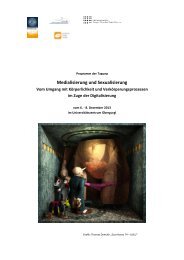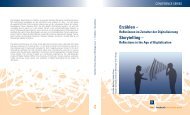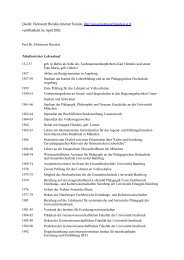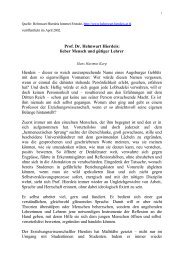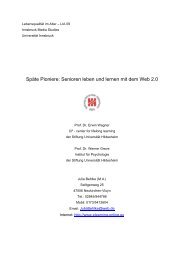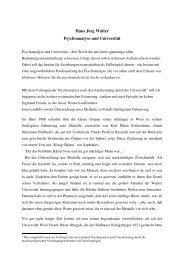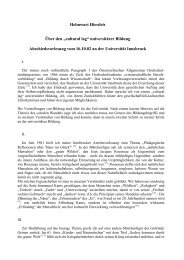Download pdf - Universität Innsbruck
Download pdf - Universität Innsbruck
Download pdf - Universität Innsbruck
Erfolgreiche ePaper selbst erstellen
Machen Sie aus Ihren PDF Publikationen ein blätterbares Flipbook mit unserer einzigartigen Google optimierten e-Paper Software.
18 Volker Grassmuck<br />
humans as competitive, aggressive and brutish and showing that we are ‘naturally nice’<br />
(e.g. Al Jazeera, 2012). Jeremy Rifkin, in his Empathic Civilization (2009) attempts nothing<br />
less than “an entirely new interpretation of the history of civilization” by focussing on<br />
the evolution of human empathy.<br />
Yochai Benkler in his latest book (2011), pits the Leviathan of the state against the Invisible<br />
Hand of the market and both against the sharing Penguin of free software and free<br />
culture. Benkler recounts how the prevalence of these models shifted throughout history<br />
from feudalism through the industrial revolution and the Cold War, culminating in the<br />
neoliberal phase from the 1980s onwards which led to the dismantling of market regulations<br />
and welfare state and to the financial crisis of 2008. “Predictably, today we find ourselves<br />
facing a new crisis, our economic systems toppled by our blind faith in the power of<br />
self-interest and in our ability to harness it effectively through incentives and payoffs”<br />
(p. 7). The current wave of (interest in) sharing then appears as a reaction to the excesses<br />
of unregulated Homo economicus. Just like on the cover of the German Edition of the report<br />
on the Limits to Privatization to the Club of Rome (von Weizsäcker, 2005) the pendulum<br />
swings back from private to public. Solidarity, cooperation, generosity, hospitality,<br />
in short: sharing is re-emerging. Values, universal values even, are the primary concern in<br />
the new working programme of the Club of Rome (n.d.).<br />
This paper proposes that our society is undergoing a Sharing Turn. It attempts to set out<br />
some of the roots, diverse manifestations and dynamics of this paradigmatic shift, and it<br />
expresses hope that the ‘trending’ values of sharing and cooperating will change the world<br />
for the better. How universal they actually are, warrants further research into the cultural<br />
and normative dimensions of sharing.<br />
The animal that can say ‘we’<br />
Sharing thoughts is what makes us human. We make tools and signs. Signs enable us to<br />
share our thoughts and feelings with each other. Music, language, images, writing, moving<br />
images – in short: media – links us together. It lets us communicate in real time, and with<br />
storage media-like images and writing: also across time, even thousands of years, which<br />
allows us to undergo a cumulative cultural evolution. We became the media-making animal<br />
for a purpose. We make them in order to compensate our individual shortcomings – to<br />
cooperate, to coordinate our actions, to preserve and pass on experiences and innovations<br />
and establish groups beyond the biological family: communities, societies.<br />
But hold on, you will say, animals form flocks, swarms, prides. From ants and bees to<br />
lions, wolves and monkeys hunting together, they are able to coordinate their actions.<br />
Aren't they cooperating?<br />
No, says Michael Tomasello, co-director of the Max-Planck-Institute for evolutionary anthropology<br />
in Leipzig, in his book Why We Cooperate (2009). Hunting is certainly a com-



